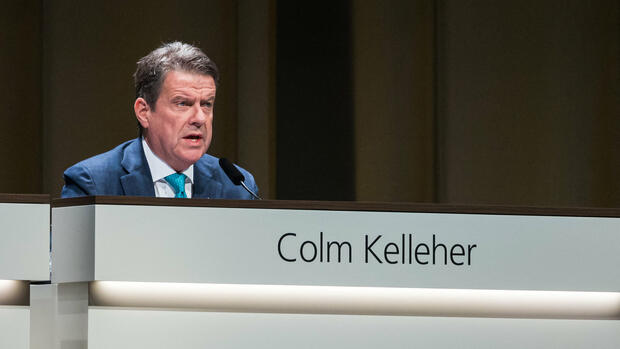UBS can continue to benefit from her heritage and expertise, said the UBS Chairman.
(Photo: Reuters)
Basel Despite the emergency takeover of rival Credit Suisse, the major bank UBS wants to stick to the previous thrust. “Our strategy is clear and will remain unaffected by the acquisition of Credit Suisse,” said Colm Kelleher, Chairman of the Board of Directors, to the Swiss bank’s shareholders at the Annual General Meeting on Wednesday.
“Our growth ambitions are focused on wealth management and asset management. We are very familiar with this and this is where we benefit from our Swiss heritage and expertise.”
The integration of Credit Suisse does not mean that UBS’s digitization efforts have come to a halt. Group boss Ralph Hamers, who has to make way for the integration of Credit Suisse Sergio Ermotti, made a name for himself with such projects. “We are fully focused on integrating Credit Suisse,” Kelleher continued.
It has not yet been decided what she will do with the former rival’s Swiss business. “All options are on the table,” said Kelleher’s Vice Lukas Gähwiler. The group will choose the best solution for shareholders, customers, employees and Switzerland. It is still too early to say how the merger will affect the approximately 120,000 employees of the two institutes.
The completion of the transaction should take a few weeks at best, but more likely a few months, according to Gähwiler. Kelleher predicted that the integration of the two businesses would take three to four years.
In mid-March, the Swiss government orchestrated an emergency takeover of Credit Suisse by rival UBS after a bank run brought the 167-year-old institution to the brink of insolvency.
In order to be able to prevent similar emergencies in the future, the Swiss Financial Market Authority (Finma) requires additional competencies. Among other things, the authority wants to be able to impose penalties like other important supervisory authorities can, said FINMA Board President Marlene Amstad on Wednesday.
“Finma does not have the power to impose penalties – it is therefore an exception compared to other large financial centers.” The events surrounding Credit Suisse have shown that the authority’s instruments reach their limits in extreme cases. Therefore, an expansion should be considered.
A senior manager regime should also be discussed – i.e. the mandatory assignment of individual responsibilities to management bodies. “This can also strengthen an institution’s corporate culture, which is closely linked to a clear assignment of responsibility and a healthy tolerance for risk,” explained Amstad.
According to Amstad, it would also be desirable for Finma to be able to provide information about its procedures. At present, most of the authority’s investigations into banks must remain secret, also for reasons of stability protection.
“From Finma’s point of view, the two instruments, buses and senior manager regime, as well as the possibility of more active communication of completed enforcement proceedings, would supplement and complement its overall functioning toolbox,” said the head of the board of directors.
More: UBS and Credit Suisse are threatened with huge job cuts and legal trouble
